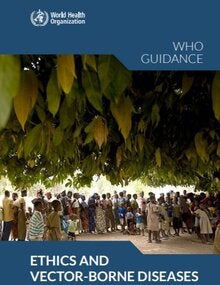Beginning with the emergence of human settlements 15 000 years ago, vector-borne diseases have been a major contributor to global morbidity and mortality. In 2017, in recognition of the growing burden and threat of vector-borne diseases to individuals, families and societies, the World Health Organization (WHO) issued a comprehensive Global Vector Control Response Strategy for 2017–2030 (1), which outlines plans to strengthen vector control worldwide through increased capacity, improved surveillance, better coordination, and integrated action across sectors and diseases. Shortly after this strategy was released, the World Health Assembly, in 2017, adopted resolution WHA70.16, which, among other things, called on the organization to provide guidance on the ethical issues associated with vector control implementation.
|

